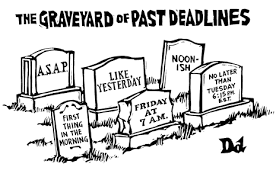
When I was growing up, the fear of missing a “deadline” was all consuming. There were deadlines for assignments, deadlines for applications, deadlines for tax returns; you name it, and there was a deadline. Miss that key date and you were dead in the water!
But, to be honest, in the second decade of the twenty-first century, we have become a society of “fudgers”. Everything seems to be up for negotiation. Payment deadlines get routinely missed, airline check-in times are ignored, movies buffer their published start time with a raft of previews and ads; and even the concept of “last call” at the pub seems to have blurred. We are more than willing to pay a little extra, argue a little harder, or lie and obfuscate a little bit more if it means that we don’t have to be held to a hard and fast rule (that, needless to say, should still apply to everyone else!) We live in a society that feels that it always has the right to renegotiate. In fact, every day we are confronted in the media by the "renegotiator in chief" in Washington who proudly proclaims that there isn't a deal that he isn't willing to break!
Is it any wonder that our kids sometimes take the same attitude towards their bedtimes, their computer use, or their homework? At Kenneth Gordon, we work with many students who have challenges with their "executive function" (that is the ability to organize and execute a specific task in a time-effective way). We help them to develop organizational strategies and external, intermediate "deadlines" to pace themselves and to create short-term, attainable goals. It is hard work for them to rewire themselves to think in this fashion especially when all of the empirical evidence from the outside world would seem to indicate to them that it is not that important!
So, the question is, do deadlines really matter? Are we simply more enlightened about things than a generation ago, or have we slowly begun to miss the point?
In his book, Predictably Irrational MIT Prof. Dan Ariely tried an experiment with three classes of undergraduates taking the same course. In Class A he announced three assignments with due dates of: October 15th, November 15th, and December 15th with penalties for lateness. In Class B, he announced the same three assignments, and stated that they could be submitted anytime on or before December 15th. And, in Class C he gave the students a choice, they could opt for the same ground rules as Class A or the same open ended approach as Class B. Class C, split pretty much down the middle.
At the end of the term he had his TAs mark the papers (he was a university prof after all!) and found that the class with the deadlines — who were forced to be organized and systematic - scored the highest, the class with no deadlines (who could procrastinate and then rush at the end) scored the worst, and that the other class split the same way depending upon what option they chose.
So what does this mean for us and our kids? The research is consistent on this point. Deadlines and clear, well-defined goals do work (just ask anyone who has to report weekly to weight watchers!) Secondly, it is our responsibility as parents and educators not to just ensure that our children meet deadlines, but that they learn how to effectively set, and follow them as well. There will come a time when there won’t be a teacher or parent setting and enforcing the rules, and our students have to be prepared and supported, by us, to master that skill for themselves.
In the meantime, it is important that we adults strive to model the attitudes and behaviours that we want children to adopt. If they see that meeting goals and following timelines are important to us, then hopefully they will begin to internalize them as well.
So, don't put this off any longer! Don't you know that you are on a deadline?!


 RSS Feed
RSS Feed
